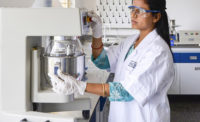WACKER recently announced that it has opened a global competence center for thermal interface materials (TIMs) in Shanghai, China. The new laboratory will conduct fundamental research in order to develop silicone-based thermal interface products and solutions for the electrical vehicle market, as well as for consumer electronics and telecommunications.
Over the past decade, thermal interface materials have been one of the fastest-growing segments of the materials market globally, with an average CAGR of more than 6%. Widely used in personal computers, consumer electronics, automotive, and telecommunications, the demand for silicone-based TIMs is expected to grow continuously, as power density is rising exponentially and thermal management systems become increasingly important. Electronic devices and batteries generate a great deal of heat that impacts their functionality and service life and can lead to serious faults. Efficient thermal management is therefore increasingly essential.
“For improved thermal management of components, the industry is increasingly turning to heat-dissipation materials,” said Christian Gimber, head of Engineering Silicones at WACKER’s silicone division. “Our thermally conductive silicones can be processed very efficiently, and they also meet the stringent and rising safety and reliability requirements imposed by the electronics and automotive industries.”
The company’s new R&D lab in Shanghai will focus on the development of silicone-based thermal interface materials and novel applications, Gimber emphasizes. “With the new lab installed, WACKER will be able to significantly improve its capability of fundamental research for such materials and come up with tailor-made products to support our customers around the world.”
Located at WACKER’s Shanghai Center in Caohejing High-Tech Park, the TIM competence center shares existing resources such as analytics and the e-mobility lab. Experts will conduct fundamental research aimed at overcoming technical hurdles with regard to performance, processability, and cost-effectiveness to leverage WACKER’s proprietary technology to work on new material designs. The facility will develop customized products and solutions with locally available raw materials for the Chinese market while also supporting other labs in the company’s worldwide network, such as labs in Germany and Korea, when creating new formulations.
WACKER reports that silicones are widely used for thermal management in the automotive, consumer electronics, and telecommunication industries. Featuring excellent electrical insulation properties and a high degree of resistance against hot and cold temperatures, chemicals, and UV radiation, silicone-based thermal interface materials are available as gap fillers, potting glues, adhesives, greases, and foams for smartphones, telecommunication base stations, battery packs, and power control unit modules for electric vehicles.
For more information, visit www.wacker.com.



